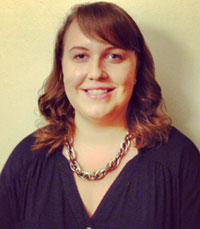Newsroom Archive
 Alumna Amanda Ingle and John Jay-Vera Fellow graduated in 2009 with a bachelor’s in Forensic Psychology. In 2012 she earned her master’s of social work from Hunter College, where she was trained in Cognitive Behavioral Therapy (CBT).
Alumna Amanda Ingle and John Jay-Vera Fellow graduated in 2009 with a bachelor’s in Forensic Psychology. In 2012 she earned her master’s of social work from Hunter College, where she was trained in Cognitive Behavioral Therapy (CBT).
She recently began working in what she describes as her ideal job. Ingle is a forensic social worker at the Legal Aid Society in the Manhattan Criminal Defense Practice. Ingle assesses and evaluates people’s involvement in the criminal justice system based on such circumstances as mental illness, drug addiction, trauma and/or chronic poverty.
“My day-to-day schedule varies: yesterday I sat with a client at Rikers Island and taught him coping skills like Progressive Muscle Relaxation,” said Ingle.
Ingle says that her experience as a Vera Fellow changed the trajectory of her professional career, which was previously focused on research and policy work. Ingle had completed an internship at the Center for Court Innovation as a Steamboat Scholar where she had worked with policy evaluators, advocating for the creation of alternative courts. Ingle was conflicted because she spent much of her time analyzing the ways these policies impacted particular populations, but she had never spent actual time with these populations.
According to their website the John Jay-Vera Fellow program “provides a unique internship and academic experience for outstanding undergraduate students at John Jay College who have a demonstrated commitment to social justice and public service.”
“I was disconnected and decided I needed a chance to get to know criminal justice consumers before I continued doing work that was about them. I discussed this with Vera faculty and they gave me that chance by placing me at Project Renewal’s Parole Support and Treatment Program for my first internship.”
Although at the time she felt she did not have an interest in clinical work, she says that she knew after her first day at PSTP that her true passion was working with those most affected by criminal justice.
According to Ingle, the Vera Seminar was a place where fellows shared experiences and perspectives and challenged each other in a supportive environment.
“I was asked to sit with uncomfortable questions that often had no apparent answers; questions that, once reflected upon, helped me identify personal values and become more aware of my biases, privileges, and position in society.”
“Amanda had to step into a leadership role at Housing and Services with no warning and no familiarity with Housing and Service's operations. That she did a spectacular job anyway is testimony to her unflappable nature and keen sense of purpose. Amanda rose to the occasion and Housing and Services remains as one of our top placements today,” said Abby Stein, Associate Professor in the Anthropology Department and Director of the Vera Fellows Program.
“While I was a student I knew that John Jay was the best place for me and that notion is even clearer now. I can look back and identify specific individuals and lessons that helped me arrive at this moment in my life. I am grateful to Professor Evan Mandery because he was the first professor to teach me the true practice of critical thinking. Professor Douglas Thompkins taught me to examine manifest and latent consequences of criminal justice policies,” said Ingle.
“And then I remember sitting in President Travis’ class and learning about recidivism rates, how minorities and people with mental illnesses are overrepresented in prisons and jails. Those were truths I couldn’t ignore. I felt a new sense of urgency to study and work, which propelled me toward internship, scholarship, and research opportunities.”
 Inside JJC (Faculty & Staff)
Inside JJC (Faculty & Staff) Technology Services Status
Technology Services Status

